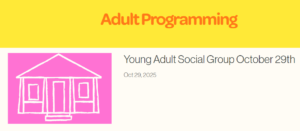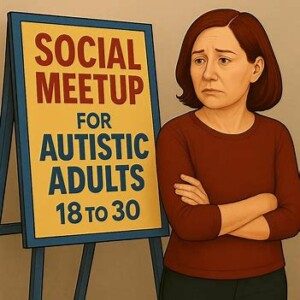So many activities for special needs adults give an age range of 18-25, 18-30 or state “young adults.” This is blatant ageism.
I’m not talking about the so-called transition services for kids right out of high school.
I’m referring to, for instance, social activities put on by some organization, such as a Halloween dance, an ice cream meetup or just some type of community gathering at a designated spot.
It’s one thing for a parent of a 23-year-old with autism to start a social activities calendar for young adults to encourage their child to make social connections with similar-age adults. That’s completely understandable.
But what about a community center for neurodivergent adults that posts on Facebook a call-out for people 18-30 to attend a get-together for various activities?
I see that 18-30 all the time, or “young adults,” including for agencies that assist with employment or job skills development.

This not-for-profit community center says it embraces and supports diversity. It says be your true self, connect with others; that it’s a space where “everyone belongs.” What about age diversity? Apparently that’s not part of their message.
Why are disabled people over 30 frequently excluded from these social events or skills-building programs?
What, when autistic people turn 31 they suddenly have job seeking skills or are employment ready? What, when an Autistic hits 31 they can now magically live independently when all along they’ve been struggling?
I once even came across a new housing development just for autistic adults – the promotion said “young” adults.
Where do these agencies and organizations believe Autistics over 30 end up? That they’re all living cushy lives, gainfully employed and no longer need services or social camaraderie among fellow Autistics?
I’m autistic. I’ve been completely on my own since 22 and never needed assistance with independent living.
However, being diagnosed with ASD very late in life, I’ve found myself yearning to meet other Autistics — and all support needs, at that. I’m perfectly fine hanging with young adults on the Spectrum.
I actually feel like a young adult, and my grueling workouts keep my body functioning at a young adult level (though sorry to say, my age shows in the skin of my hands).
But I’m sick and tired of getting excited about a new posting for an autistic social meetup, only to keep reading and seeing “for adults 18 to 30.” WTF.
Autistic people don’t die at 31. Autistics in their 30s, 40s and 50s ARE STILL HERE. This older age demographic also needs help with employment services.
I work several hours a week as a direct support professional for the adult ID/DD population.
There are two locations that get jammed with multiple day programs: a food court at a popular mall, and a particular day during noon hours at a popular bowling center.
And I’ll admit, you’d be hard-pressed to find any individuals who appear over 40. It’s just a swarm of 20- and 30-somethings.
Look hard enough and you’ll find one or two 50ish-looking individuals.
Where are all the older ones?
It’s tempting to say they’re all dead, being that the ID/DD population has a much shorter life expectancy.
It’s also tempting to propose that only the younger ones need the day programs because the older ones have either found full-time employment or have psychologically outgrown the day program.
Well, that first supposition isn’t realistic. But the second one may very well make sense.
Some ID/DD adults may tend to grow tired of day programs and eventually prefer to spend their days at home – whether it’s a host home, their parents’ house or a sibling’s house – or even their own place (with support, of course).
Many of the local social events that I’ve caught wind of via Facebook are open to ALL abilities – all autism levels or support needs – but often not open to all ages! THIS IS AGEISM.
You may be wondering why I’d want to hang with much younger adults.
Hey, when you finally get an autism diagnosis well into your 50s, and finally – you can make sense of everything – you’ll want to meet all the Autistics you can meet.
I finally found my tribe, and as a neurodivergent thinker, I’m not going to limit my socializing to only those over 40 – especially when I just can’t find them.
I belong to an autism meetup dot com group: for HFA’ers. Many participants are in professional lines of work.
I’ve met the following: IT professionals, a school nurse, an architect, three lawyers, a school teacher, a computer programmer, a grant writer, a graphic designer, a neuropsychologist, a mental health counselor, to name a few.
But even at these meetups, I’m usually the oldest one, and not by a few years. But at least there’s no ageism involved.
So why don’t I myself start up regular social events “for Autistics of ALL ages”?
Actually, I’ve made the attempt three times and not enough people showed interest to get something materialized.
I’ve made a post here and there, even once favorably responding to another Autist’s suggestion that the Facebook group get a speed dating thing going. Doggone, I think I was the only one who expressed interest. But can you imagine that: autistic speed dating?
Funny thing is, when I was in my 20s, I always thought that spending a whole hour with someone you meet on a blind date through the personal ads was ridiculous.
I had always thought that it should be at most, 15 minutes. You know within FIVE minutes if that other person is going to be someone you want to spend cozy evenings with. But I never called my idea “speed dating.”
According to Google, speed dating was “invented” in 1998 by Rabbi Yaacov Deyo.
I’m sure that many autistic individuals, with their logical and practical thinking processes, had conceived this idea long before it became popularized by the rabbi.
It’s just that we kept this brilliant idea to ourselves, believing it’d never take. I invented it 10 years prior!
But back to Facebook: Several younger middle-agers in the autism Facebook groups I participate in have tried to corral up attendees for casual meetups like at pizza places – with nothing ever materializing.
When it’s so difficult for autistic adults of any age to want to meet up with strangers, ageism should be outright banned. Social events for those with ID/DD should be open to all ages, just like they’re open to “all abilities.”
I wonder how many advocates, who are vehemently outspoken about ableism, are guilty of ageism.










































